A Notion Of Sound | |
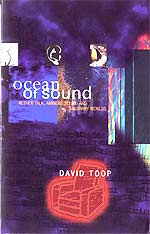
| David Toop is a musician, composer, writer and sound curator. He has published three books: Rap Attack (now in its third edition), Ocean of Sound, and Exotica (selected as a winner of the 21st annual American Books Awards for 2000). His first album, New and Rediscovered Musical Instruments, was released on Brian Eno's Obscure label in 1975; since 1995 he has released five solo albums - Screen Ceremonies, Pink Noir, Spirit World, Museum of Fruit and Hot Pants Idol - and curated five CD compilations for Virgin Records - Ocean of Sound, Crooning On Venus, Sugar & Poison, Booming On Pluto and Guitars On Mars. Needle In the Groove, a collaborative album with novelist Jeff Noon, was released on Scanner's Sulphur label in May 2000 In 1998 he composed the soundtrack for Acqua Matrix, the outdoor spectacular that closed every night of Lisbon Expo '98 from May until September. He has recorded shamanistic ceremonies in Amazonas, worked with musicians including Brian Eno, John Zorn, Prince Far I, Jon Hassell, Derek Bailey, Talvin Singh, Evan Parker, Max Eastley, Scanner, Ivor Cutler, Bill Laswell and Haruomi Hosono, and collaborated with artists from many other disciplines, including theatre director/actor Steven Berkoff, Japanese Butoh dancer Mitsutaka Ishii and writer Jeff Noon. As a critic he has written for many publications, including The Wire, The Face, The Times, The Sunday Times, The Observer, Arena, Vogue, Spin, GQ, Bookforum, Pulse, Urb and The Village Voice. He curated Sonic Boom, an exhibition of sound art showing at the Hayward Gallery, London, from April to June, 2000. Other projects currently in progress include the composition of a soundtrack for Mondophrenentic (37th Floor At Sunset: Music For Mondophrenetic CD to be released by Sub Rosa in August 2000), and a CD-ROM installation created in Belgium. In January 2000 he exhibited the sound installation Dreaming of Inscription On Skin with Max Eastley at ICC in Tokyo. He is currently a visiting Research Fellow at the London Media School. |
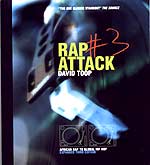
| I first met David Toop when he gave a reading from and fielded questions about Ocean of Sound as part of the Litmus: Spacex Literature and Music series of events I promoted in Exeter. Since then I have kept in sporadic e-mail contact. Visiting the Sonic Boom exhibition this spring prompted me to ask David for an interview. Sometime later, after visits to Japan [David] and the States [me] which have delayed things, here it is. Rupert Loydell: Am I right in thinking this is a very 'public' year for you? Your presence is manifest in the needle in the groove cd with Jeff Noon, with Rap Attack 3, and at the Hayward where you've curated Sonic Boom. David Toop: Yes, relatively public and very full. The last six years have felt like bursting out of a prison, letting go, just releasing material of all kinds. Creating a soundtrack for Expo in Lisbon two years ago was a big step for me. The daily audiences were so huge, the project took so long and working with that kind of multi-national team was a real eye opener. I know that at one time in my life I would have been almost phobic about that, quite terrified, but then I realised that those situations are full of potential, despite the problems that come with mass communications and big budgets. Sonic Boom was an opportunity to put a certain personal view of sound and music across on a bigger scale, but also a chance to place artists and musicians I admire in the public earshot. More than 36,000 people visited Sonic Boom and aside from feeling proud of that, I'm interested to see what effect it has in the future. So having a public year has 'career' implications, but it also cause certain effects that aren't possible when you're working, as I have done for most of my life, at the furthest possible distance from the centre of mainstream culture. So how did you get here from there? - 'there' being [I think I'm right] a member of the LMC in its draughty Camden upstairs room incarnation, with a commitment to the extreme fringes of improvisation; 'here' being a respected musician, exhibition curator, compiler of CD anthologies, and respected and critically-revered writer on a variety of topics, from rap through An Ocean of Sound to exotica and muzak. The London Musicians Collective wasn't year zero for me. When I was at art school in 1968 I was interested in putting on events and even before then, when I was at grammar school, I co-produced a little magazine, wrote music criticism (or at least plagiarised the sleevenotes of blues albums I owned), put on art exhibitions and music/visual shows. The critical point for me was when I left art school. I was quite remote from any feeling of being in the 'real world', playing intense improvised music with Paul Burwell and experiencing a strong sense of detachment from 'the scene', even though we were sufficiently part of it to get reviews as 'up and comers' from people like Martin Davidson and Ian Carr. We even did a Jazz Workshop for Radio Three in 1973, though the BBC has either lost or erased the original tape. Paul and I were collaborating with artists in different fields - sound poet Bob Cobbing, an amazing Butoh dancer called Mitsutaka Ishii, visual artists and performance artists like Carlyle Reedy and Marie Yates. There was a strong need to analyse all the time: what are we doing, why are we doing it, what is the significance of sound in our society, what did it or does it mean in other cultures? I felt cursed by that. I'd go out a lot, to places like the 100 Club to see Ray Russell or the Chris McGregor Group, and wish I could just enjoy it, the way the rest of audience seemed to be just giving themselves up to the music while I was sitting there, soaking up details, having opinions, reflecting. Tortured young man in front row! I was also spending a lot of time with the Lathams, trying to understand what John Latham was talking about with his time base theory, usually failing but developing my own ideas as I listened. As well as getting a lot from the people I directly worked with, I was very influenced by John Stevens, who I seem to miss a lot, even though I couldn't say I was a close friend of his. Paul and I used to attend his workshops in Ealing, hosted by Christopher Small, who's now pretty well known for writing books on music. John was a great communicator, even though he could talk you into submission. He also had a knack of instilling confidence in novice musicians like me, and fostering an appreciation of improvisation as a complex craft, a touchstone you can come back to when you lose yourself or lose the direction of your music. Most of my current ideas on writing and music formed at that time, 30 years ago. I was soaking up information and pouring out ideas but for various reasons, I didn't know how to get them across. I made radio programmes, for Radio Three, but three radio programmes in three years wasn't going to do much, particularly since nobody seemed to have a clue what they were about. Having that long gap of years between the imagining and the realisation has been frustrating and absolutely crucial. Twelve years in the sweat shops of mainstream journalism really taught me how communicate to at least some part of a mass audience. How to tell a story, in other words. At the same time, there's a lot of material stored up. If I'd been publishing books and records since the early Seventies I'd probably be knackered. |
You put a new twist on some of the Virgin anthologies you compiled by introducing them with fiction, short stories, something that presumably links to both the new CD with Jeff Noon and the Buried Dreams CD some time back with Max Eastley. Did you just get bored with writing standard-issue sleeve notes? Did I? I used to write press biographies for pop stars. I got so fucked off with it that I'd demand more money than I thought they'd pay, then say I'd only do it as a short story. It really started with Buried Dreams, though. We wanted the album to be more than just a bit of plastic with a music carrier inside. I was interested in the idea of writing short stories as a score for the music, like storyboards for a film, so the stories ended up on the sleevenotes, then found their way into Exotica, then became the basis of the Hot Pants Idol CD I did. I like to remix what I do all the time. The point about the compilations was that I felt compilations tend to ruthlessly narrow the focus of musical listening. Invariably, they concentrate on one genre or style, then package the collection within a strong aesthetic, with particular styles of contextualisation framing the idea of how listening should happen. That's as true of a brilliantly packaged archival box set as it is of some TV advertised Greatest Love Songs package. Listening with any kind of freedom becomes almost impossible. I didn't want explanatory notes, either explaining my choices or filling in the history of the music, and Simon Hopkins, who was responsible for that series, totally backed me up. I wanted people to hear a segue from George Clinton into Michael Prime and sort it out for themselves. So the notes were a joke. One reviewer - otherwise very positive about what I do - described them as terrible, sub-Burroughs science fiction. That was amusing, because they were deliberate and affectionate parodies of cyberpunk, the Burroughs of Nova Express, crime fiction, Joseph Conrad, and so on. The notes for Sugar and Poison, for instance, were a parody of Jack Womack's extraordinary grammatical perversion of the language, which I was knocked out by. With that particular compilation, I was sick and tired of the way soul ballads had been dismissed as romantic escapist drivel over the years by intellectuals of all persuasions and colours and then ended up being packaged by record companies as generic fuck soundtracks. The relationship between the notes, the artwork and the music was an attempt to create unease, to make a gentle push towards listening at a depth beneath the preconceptions about what was being said in the lyrics, the vocal techniques, the tempo, the type of chords, the arrangements and all the other indicators of genre stereotypes. I suppose some people thought it was a fuck soundtrack for manic depressives. Personally, I find that album overpoweringly romantic, even though it's supposed to be a bit disturbing, but then romance is disturbing in itself. | |
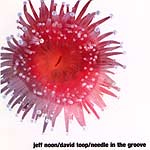 | Jeff Noon's needle in the groove book is full of dub and chrome, city streets and flcikering lights, techno and dance music. Your CD project of the same name doesn't seem to reflect the hard-edged dance music of the book; how did you decide to ignore all that, along with the book's theme of remixology, and go for a more ambient, exploratory approach? It's almost impossible to read in a flexible, expressive way over hard-edged dance music. That's one practical issue that I was aware of, having tried it, so I didn't want to subject Jeff to the same difficulties. Second thing is, I heard something other than dance music in the book. I heard a weird soup of skiffle, blues, hip-hop beats, Manchester rock and psychological noise (if that doesn't sound too pretentious). The remixing in the book is some new form of remix, a technology that we don't have and that doesn't bear much resemblance to the likes of Fatboy Slim, so I took a huge collection of fragments and jammed them all together in the computer. I was trying to make a total scenario - the physical environment of the book, the emotional and psychological landscapes, some sense of this musical confusion and interpersonal turmoil - and then give it a depth that you could fall into the way the characters fell back into their own past. Many of your recent CDs have been collaborative projects [although I understand some of that is you mixing together recorded offerings from around the world]. Could you share some favourite moments in the making of your music, or of the interaction - musical or otherwise! - that produces your music? I work really quickly and don't mess about. I don't take drugs. I don't drink alcohol when I'm making music. I eat fruit and drink water. I'm really boring. Because of that, and because of who they are, musicians come in and work in a really focussed way. I can't stand all that hanging around in studios, prevaricating and talking about nothing. On Pink Noir, Talvin Singh heard the track for the first time in the studio, set up his tablas, conceived an interlocking part in his head and then played it by overdubbing himself just once. The two parts fitted together perfectly. He's a great musician. Evan Parker played without having heard the track and tore it up. I try to play everything in one take, just to instill some feeling of instantaneity or spontaneity or 'danger' into electronic music, and everybody I work with seems to do the same. One thing I found really funny when I recorded Screen Ceremonies, back in 1995, was the fact that the engineer knew why I wanted to use a bucket of water. He knew I was going to play flutes in it, even though he didn't know anything about me. That's progress. Now I record at home and I don't have to think about the cost so much, or have to justify doing ridiculous things to an engineer who thinks it's daft or argues that it won't work. But I really enjoy working with artists like Max Eastley because they bring extraordinary ways of working to mundane environments. I wanted to record Max's Violet Ray Vitalator, a crackling glass tube that you pass over your skin. He has a couple of these things that he inherited from his father, who was an avid, or more than avid collector. The Vitalator was a peculiar device that was supposed to give energy and cure medical complaints with electricity - a sort of early 20th century aromatherapy. Of course, it made a fucking huge electrical hum so you move very quickly from the absurdity of the situation to the technical challenges that have to be solved. That allows everybody to relax, particularly the engineer, and then the sound becomes the focal point of the session, rather than the eccentric means or technology used to produce it. |
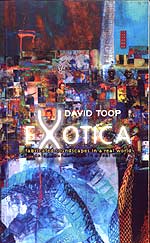 | How do you feel about the time it has taken for people like yourself and Brian Eno to be accepted seriously by the music industry [or part of the music industry]? Brian was accepted a long time ago, because of Roxy Music. I don't have a Roxy Music in my back pages; just the Flying Lizards, which doesn't have quite the same credibility. A student asked me the same question recently and wondered if it made me cynical. Being cynical about these things is corrosive. If it's true what you say about acceptance, and I'm not sure I believe it, then I'm glad it's happening for me now, at the age of 51, rather than having it happen to me at 21 and now be a fucked up old git with nothing left to say. But what I'm proposing in my writing is something different and whether that view of music turns out to be useful or not, the fact that it doesn't fit with received opinions about music means there's going to be a long delay before it begins to filter through to a slightly wider audience. That's how you'd want it, surely. Otherwise it's just a shiny new version of what's gone before. As for the music industry, I don't feel part of it, though I accept I have connections with aspects of it. How do you personally navigate through all the music around these days? Ocean of Sound obviously offered one idea of making links and manoeuvring through genres, countries and time; more and more of us seem to have had to adopt ideas of networks and webs as a tool for exploration [maybe even survival when overload kicks inÉ]. I listen to music these days because I'm drawn to it for some reason. Maybe it becomes relevant to what I'm feeling or maybe somebody gave me a CD and I'm curious to hear what the person who gave it to me sounds like. Going to Japan, I'm given loads of CDs and working through them, trying to work out where they fit, is quite absorbing. I've just been asked to write a review of an Astor Piazzolla biography so I pulled all my Piazzolla records off the shelves and started listening as I read. It's like falling in love all over again but I'm hearing what's in the grooves in the light of the experiences I've had since I first discovered his music. To be honest, I don't listen to that much music by other people these days. I spend a lot of time on my own music and when I'm writing, I can't concentrate if I listen. I live in a house with a partner who likes The Eels and a daughter who likes Britney Spears, so my listening time is limited anyway. I may not love their musical tastes but I love them so it helps me to become more tolerant. I also like to concentrate on one or two albums. For years I flitted about from album to album, track to track. I had to. I was being sent every new release and was expected to know the entire sweep of musical activity and be able to write about it all. Recently I've been listening a lot to a Japanese composer - Minoru Miki. I listened to him a lot in the mid-1970s and I've come back to him. I don't care he's not part of the fashionable canon. I listen to Sorabji as well, who is an oddity of 20th century composition, and pieces like Takemitsu's music for films like Yotsuya Kaidan. They have endless depths. I can catch up on new releases when I feel I'm genuinely interested to do so. I met Christophe Charles and Carsten Nicolai early this year in Tokyo - I liked them as people and I like what they're creating. Even though I've been listening to digital composers like them for some years, I'm only now getting a more complete picture of my own response to the changes that are taking place in music. At the moment, I'm more excited to see the new Wong Kar-Wai film than any CD that's on the release schedule. Not that cinema is particularly dynamic right now, but there comes a point where you've heard so much. I realise I've been speed reading, or speed listening, for the past 16 years, ever since I became a professional writer. Now I've got shot of journalism, I can slow down again and listen with more thoroughness. I'd rather spend time cooking and studying food, which is more central to my life anyway, than keeping up with a million CDs. |
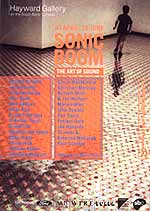 | Sonic Boom was obviously a major event; I'd like to move on to that now. If you don't mind, I'd like to start with what I perceived as some of the problems with the show. The first was the architecture of the show. I got very bored with peering into darkened rooms, and thought the gallery wasn't actually put to good use in many ways - there was a lot of empty space and shadowed corners in the Hayward. Did you consider putting more work in? Or asking the artists to make a different sort of work that considered the gallery space itself? My original wish list of artists was much longer and I was persuaded to cut it right back. I learned the sense of that when the problems of budget restrictions, dealing with artist's demands, articulating space and administering other practicalities became evident. Now I feel the number was just about right. A lot of artists wanted to build rooms for themselves and I had a premonition of it becoming an exhibition of Portakabins. I understand that everybody want to isolate their work but certain artist really benefitted from being brought out into the open. On the other hand, those dark rooms were absolutely essential. Clubs and concert halls are dark rooms. Shadows are a prerequisite for a large proportion of music Several of the pieces were very interesting, musically, but didn't seem to me very interesting visually - it was difficult, for instance, to find the Greyworld corridor installation visually stimulating; yet sonically it was one of my favourite pieces; Christina Kubisch's headphone installation likewise - visually it looked like the washing line spaces behind blocks of flatsÉ Did you curate with the visual side given equal consideration? My first priority was sound, but the brief was to make an exhibition that was also visually sophisticated. That's not easy, since works that are both visually and sonically exciting are quite rare. But I think there's more to it than a piece being visually striking. The Christina Kubisch, for example, was one of the most popular works in the show. I think that was partly because people had no expectations of it. They walked out onto the sculpture court with their headphones, found not much there other than lines of cable, put the headphones on and found themselves in a different world. The grin factor on that piece was very big. I'm a bit puzzled by what you describe as the Greyworld corridor installation. Their work was outside, on the steps and the ramp leading to and from the Hayward. The only artist who had a corridor was Ryoji Ikeda. Ryoji wanted his ramped corridor to be sealed so that you experienced a total enclosure of whiteness, intense light and intense high frequency. The problem is that the gallery needs to have wheelchair access and with thousands of people tramping through, the carpet gets filthy. When you come to a gallery as a visitor you don't want to know about all these difficulties. You just want the perfect experience. But when you work at the sharp end, as a curator or organiser, then you have to make the best you can out of a lot of irritating obstacles to perfection. I had no problem with the overspill of sound between pieces that some critics and reviews have mentioned, but it did seem to me some of the quieter pieces suffered in contrast to the 'big' names and 'big' installations. Max Eastley's sculptures were wonderful, so was Lee Ranaldo's guitar with it's little projection inside; but both were difficult to find within the show - I mean 'psychically' [perhaps?] rather than physically: they didn't necessarily make their presence known to the exhibition visitor. You had to find them, you had to work to find them. I wanted Max to have a lot of pieces in the show because his work is so quiet and undemonstrative. You'd turn a corner and find another piece by Max and my hope was that eventually the point would emerge through accumulation. One day I saw a whole line of people listening to Max's biggest installation - Procession of Ghosts - all of them in a line with their ears really close to the dancing wires. The issue of overspill is very subjective. Ultimately, it represented my idea of a sound exhibition, in which sound spill was a strong element within the perception of the show as a whole. Some critics wrote about the overspill as if it was an issue I wasn't aware of, or hadn't thought through. |
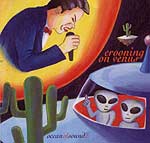 | And, playing devil's advocate [and pretending not to have read the subtitle 'art of sound' - as opposed to music], how would you answer the retort that this sonic exploration is all well and good, but it isn't, in itself, music? I'd like to ask quite seriously, too, what you think about the idea that much improvisation should be regarded as research, and needs applying, filtering back into the mix as it were? - much as scratched beats are now an everyday occurence in pop/chart songs. I despise this functional approach to music. As I said in my first answer, improvisation is a craft that can occupy a lifetime. It can be applied in all musical situations but it's not a fucking effect that you stick into something more important or more 'finished'. The distinctions between music, sound and noise are ongoing and fluid and contextual and subjective. To me, that's not the problem. The difficulty lies in developing qualititive and useable evaluations of the thing we call music. Why is one piece great and another piece rubbish? Otherwise it's all just a tidal wave of stuff. When noise, or sound, does work in a simple way on its own it still generates an emotional and physical thrill/response, sometimes in a way I thought I'd left behind as I reached my 40th birthday! I'm thinking specifically of the wonderful, unholy racket of the dragged guitar in Christian Marclay's exhibit. Any comments on that? You're obviously someone who still responds to all sorts of music - does that include revelling in noise itself? One of my current side projects is archiving the many hours of tape made by the Alterations quartet of Peter Cusack, Terry Day, Steve Beresford and myself. There are companies wanting to release some CDs but hours of live recordings need to be monitored, transferred into the computer, edited, then transferred to CD. What surprises me is how much I'm enjoying the racket we made. A lot of unabashed noise, sometimes really childish and vulgar and sometimes very controlled and quite gorgeous (I can be that flattering about a band I was in because it was so long ago it feels fairly detached). What also surprises me is that you make a connection in your question between growing older and losing an engagement with the sensuality of sound. I find it's the opposite. As I grow older, the distinctions between categories - noise, sound, music, silence - become genuinely less meaningful. In other words, it's no longer something I'm reading about in John Cage and then trying to apply. I mentioned food and cooking earlier. That structural distinction that Lvi-Strauss wrote about in books like The Raw and The Cooked is still very interesting. Is noise raw food and music cooking? Mmmm, not quite butÉ a lot of Japanese cooking may seem to be just food - sushi, for example, a seaweed salad, or tofu in iced water - but in fact it's a remarkably artful form of cooking that blurs the distinction between nature and culture. That's also true of Japanese gardening. The way a tree is trained creates an impression of age and weathering. Quite artificial, in fact. In theory, the more mature you get, the more you should be able to appreciate qualities such as astringency, bitterness and sharpness. When I came to Exeter to read for the event you organised a few years ago, I remember David Sawyer, the instrument inventor, talking to me afterwards about children and their eating habits. He claimed that children have more sensitive palettes than adults. I think that's true from observing the changing diet of my own daughter and cooking for her. Now she's 10 she's able to eat some Thai food, soba noodles or South Indian food and finding it more interesting than chicken nuggets and all the other bland frozen stuff that small kids love. But unmediated noise is just a beautifully rich conglomeration of tones. The fact that it's raw, rather than cooked, means that we can be absorbed by tonal relationships and rhythms that are quite alien to human motivation. Their apparent randomness conforms more to general scientific principles than human characteristics and we can learn from that. That distinction - nature and culture - is one of the formulations that has always fascinated me and one of the defining aspects of digital music is that it hovers on the edge between human decisions and machine processes. A lot of it is music that grows within a software environment. A kind of digital moss. That's something we all have to get used to. © Rupert Loydell 2000 Rupert Loydell would like to thank David Toop for the generous amount of time and attention given to this interview; A.C. Evans for the phrase 'A Notion of Sound' which I appropriated from him; and Alistair Fitchett for publishing this and other pieces. |